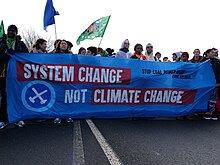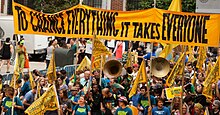Climate movement


The climate movement is the collective of nongovernmental organizations engaged in activism related to the issues of climate change. It is a subset of the broader environmental movement, but some regard it as a new social movement itself given its scope, strength, and activities.
History
The climate movement has rapidly evolved in the first decades of the 21st century, starting as one of the many causes of the environmental movement.
Activism related to climate change began in the 1990s, when major environmental organizations became involved in the discussions about climate, mainly in the UNFCCC framework. In the 2000s several climate-specific organizations were founded, such as 350.org, Energy Action Coalition, and the Global Call for Climate Action.
Mobilization for Copenhagen 2009
The 2009 United Nations Climate Change Conference in Copenhagen was the first UNFCCC summit in which the climate movement started showing its mobilization power at a large scale. Between 40,000 and 100,000 people attended a march in Copenhagen on December 12 calling for a global agreement on climate.[1] And activism went beyond Copenhagen, with more than 5,400 rallies and demonstrations took place around the world simultaneously.[2]
Activities
2014 People’s Climate March

The climate movement convened its largest single event on 21 September 2014, when it mobilized 400,000 activists in New York during the People’s Climate March (plus several thousand more in other cities), organized by the People's Climate Movement, to demand climate action from the global leaders gathered for the 2014 UN Climate Summit.[3][4]
Fossil Fuel Divestment
The Fossil Fuel Divestment movement calls for colleges and universities, as well as cities, states, religious institutions, and pension funds to withdraw their investments from fossil fuel companies. 350.org launched its Go Fossil Free campaign in 2012 with Bill McKibben's "Do The Math" speaking tour around the country. 350.org explains that the reasoning behind this campaign is simple: "If it is wrong to wreck the climate, then it is wrong to profit from that wreckage."[5] The Fossil Fuel Divestment movement escalated tactics in the spring of 2015, with 19 students arrested at Yale University, a week-long blockade of Harvard University's administrative buildings, a 70-student sit-in at Tulane University, and other arrestable actions.[6][7][8]
Climate Mobilization
Since 2014, growing portions of the climate movement, especially in the United States have been organizing for an international economic response to climate change on the scale of the mobilization of the American home front during World War II, with the goal of rapidly slashing carbon emissions and transitioning to 100% clean energy faster than the free market is likely to allow. Throughout 2015 and 2016, The Climate Mobilization led grassroots campaigns in the U.S. for this scale of ambition, and in July 2016, activists succeeded in getting text adopted into the Democratic Party's national platform calling for WWII-scale climate mobilization.[9] In August 2015, environmentalist Bill McKibben published an article in the New Republic rallying Americans to "declare war on climate change."[10]

School strikes for climate
Since August 2018, inspired by Greta Thunberg, children and students in at least 270 cities took part in school strikes for the climate.[11]
Youth Climate Strikes
Organized by Isra Hirsi, Haven Coleman, and Alexandria Villaseñor, the Youth Climate Strikes US, encourages youth in the United States to protest on behalf of the environment. Paralleling the work done by Greta Thunberg, this organization encourages students to join the school strikes for climate, both in the US and globally. Isra Hirsi is the daughter of Ilhan Omar, a US representative from Minnesota, and an advocate for the strikes. Isra pushes the climate strikes to become more diverse, stating "Those that are disproportionally affected by climate change should be at the forefront of the issue, advocating for ourselves and our communities" and "A diverse group of organizers doesn't mean a diverse group of participants."[12] The Youth Climate Strike on March 15, 2019, included students from 47 countries and over almost all 50 States participating in the movement. [13]
Global Climate Strike
Between 20 and 27 September, 2019 was the Global Climate Strike. This appeal mobilized a record 7.6 million people take to the streets and strike for climate action. The biggest climate mobilisation in history. The strike was followed in more than 185 countries.[14] In some of these countries, the call exceeded the student character and was called at the labor level by some unions as happened in Italy.[15]
Roles of other movements
The climate movement is closely connected to other parts of the environmental movement, in particular groups aiming for a sustainable society and sustainable energy. Also, the faith community has been active in the climate movement, both at an interfaith level (such as in Our Voices) and at the specific level of each denomination (such as the Global Catholic Climate Movement). With this movement, new youth international organizations have emerged to join the climate change movement such as Fridays for Future[16] or Extinction Rebellion.[17]
Methods
These are several approaches that have been used in the past by climate advocates and advocacy campaigns:
- the provision of information,
- framing of information about aspects of global climate change, and
- challenging the terms of political debates.
All three of these methods have been implemented in climate campaigns aimed at the general public. The information about the impacts of global climate change plays a role in forming climatic beliefs, attitudes, and behavior, while the effects of other approaches (e.g. provision of information about solutions to GCC, consensus framing, use of mechanistic information) is yet mostly unknown.[18] The third approach is to create space for discussions that move beyond questions of economic interests that often dominate political debates to emphasize ecological values and grass-roots democracy. This has been argued to be crucial to bringing about more significant structural change. [19]
Targeting of activists
The United States government through its domestic intelligence services targeted, as "domestic terrorists," environmental activists and climate change organizations, including by investigating them, questioning them, and placing them on national "watchlists" that makes it more difficult for them to board airplanes and that could instigate local law enforcement monitoring.[20] Unknown actors also secretly hired professional hackers to launch phishing hacking attacks against climate activists who were organizing the #ExxonKnew campaign.[21]
See also
- Business action on climate change
- Environmental movement
- Ecological movement
- Environmental racism
- List of environmental protests
References
- ^ "Climate activists condemn Copenhagen police tactics". BBC News. 13 December 2009. Archived from the original on 15 December 2009. Retrieved 14 December 2009.
- ^ "International day of demonstrations on climate change". CNN. 26 October 2009.
- ^ Alter, Charlotte (September 21, 2014). "Hundreds of Thousands Converge on New York to Demand Climate-Change Action". New York: time.com. Retrieved December 30, 2014.
- ^ "Archived copy". Archived from the original on 2014-10-14. Retrieved 2014-12-30.
{{cite web}}: CS1 maint: archived copy as title (link) - ^ "Archived copy". Archived from the original on 2013-11-14. Retrieved 2013-08-05.
{{cite web}}: CS1 maint: archived copy as title (link) - ^ McDonald, Michael. "Yale Students Cited at Fuel-Divestment Protest." Bloomberg.com. Bloomberg, 9 Apr. 2015. Web. 15 Apr. 2015. <https://www.bloomberg.com/news/articles/2015-04-09/yale-students-invade-president-s-office-demanding-divestment>.
- ^ Harvard Heat Week
- ^ Lipinski, Jed. "Tulane Students Occupy President's Office to Protest Fossil Fuel Investments." NOLA.com. NOLA Media Group, 14 Apr. 2015. Web. 15 Apr. 2015.
- ^ Greene, Russell (19 July 2016). "Beyond Paris: Finding the Courage to Face the Climate Emergency". CommonDreams.
- ^ McKibben, Bill (15 August 2016). "We Need to Literally Declare War on Climate Change". New Republic.
- ^ Damian Carrington (4 December 2018). "'Our leaders are like children', school strike founder tells climate summit". The Guardian.
- ^ "The climate movement needs more people like me". Grist. 2019-03-25. Retrieved 2019-10-14.
- ^ "10 things you've always wanted to ask the students skipping school to fight climate change". Greenpeace. Retrieved 2019-10-14.
- ^ "Global Climate Strike → A Historic Week". Global Climate Strike → Sep. 20–27. Retrieved 2019-10-21.
- ^ "Sciopero generale clima 27 settembre: tutti i servizi a rischio". Money.it (in Italian). 2019-09-24. Retrieved 2019-10-21.
- ^ "About - FridaysForFuture". www.fridaysforfuture.org. Retrieved 2019-10-21.
- ^ "About Us". Extinction Rebellion. Retrieved 2019-10-21.
- ^ Skalík, Jan; Chabada, Tomáš; Urban, Jan (2018-12-28). "Effects of information-based interventions and framing interventions on attitudes to climate change and mitigation behavior". Envigogika. 13 (2). doi:10.14712/18023061.563. ISSN 1802-3061.
- ^ Holdo, Markus. "Sincerity as Strategy: Green Movements and the Problem of Reconciling Deliberative and Instrumental". Environmental Politics. 28 (4). doi:10.1080/09644016.2018.1457294.
- ^ The Guardian, 24 Sept. 2019, "Revealed: How the FBI Targeted Environmental Activists in Domestic Terror Investigations: Protesters Were Characterized as a Threat to National Security in What One Calls an Attempt to Criminalize their Actions"
- ^ The Guardian, 11 June 2020, "Hack-for-Hire Group Targeted Climate Activists behind #ExxonKnew Campaign"
